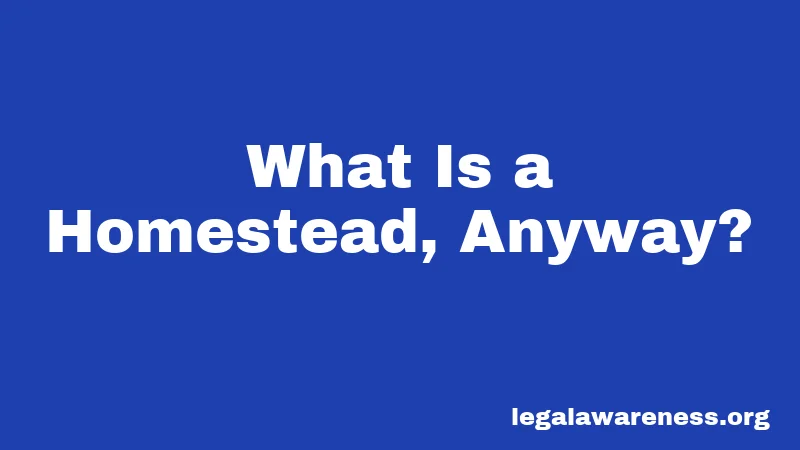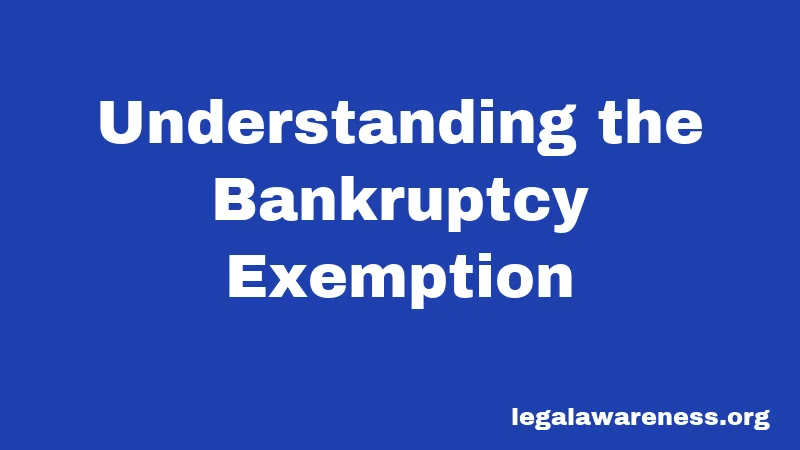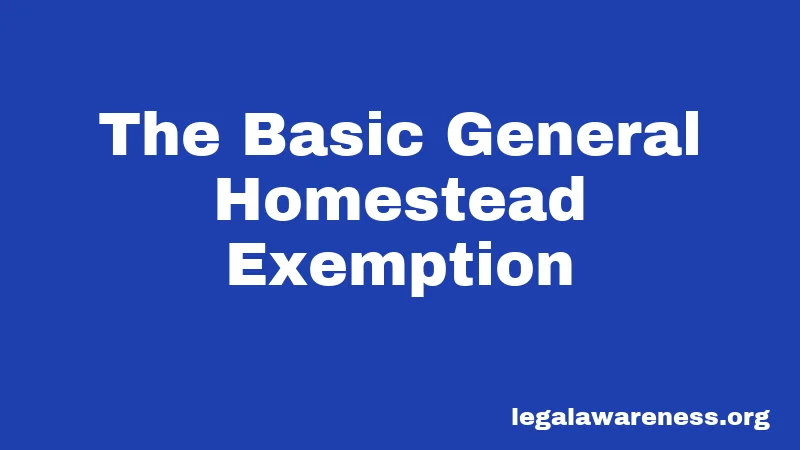Illinois Homestead Laws (2026): What Actually Protects Your Home
Here’s something most people don’t realize. Your home is probably your biggest investment. But do you know what actually protects it from creditors or lawsuits? Honestly, most people have no clue.
In Illinois, there are two totally different types of homestead protection. One protects you from debt. The other saves you money on property taxes. They work completely differently, but both matter a ton. Let’s break down exactly what you need to know.
What Is a Homestead, Anyway?

Think of a homestead as your legal protection against losing your home. Basically, the state of Illinois sets aside a certain amount of your home’s value that creditors cannot touch.
You could have a house worth $400,000. If a creditor wins a lawsuit against you, they might try to force you to sell your home to pay them. But here’s where homestead protection kicks in. Stay with me here. A chunk of your home’s value is legally protected. That means you get to keep it, no matter what.
The Big 2026 Change You Need to Know
Okay, pause. Read this carefully. Illinois made a massive change on January 1, 2026. This is huge.
The homestead exemption increased from $15,000 to $50,000 per person. For jointly owned property (like a married couple), it went from $30,000 to $100,000. This is the most important protection change in over ten years.
Why does this matter? Let’s say you and your spouse own a house together worth $350,000. Your mortgage is $250,000. That leaves you with $100,000 in equity. Under the old rules, creditors could take most of it. Today? That entire $100,000 is protected by law. Pretty straightforward.
Understanding the Bankruptcy Exemption

This protection applies when you’re facing serious financial problems. If creditors sue you or you file for bankruptcy, your homestead exemption is your shield.
The homestead exemption more than tripled from $15,000 to $50,000 for individual property owners. This change takes effect for any bankruptcy filed after January 1, 2026.
Not sure what counts as your “homestead”? Good question. It applies to single-family homes, condos, and co-ops. It must be your primary residence—the place you actually live. You can’t use this exemption on a rental property or vacation home.
Wondering if this applies to you? Let me break it down. If you own your home and a creditor gets a judgment against you, they’ll look at your equity. Take the home’s value. Subtract what you owe on the mortgage. That’s your equity. If it’s under $50,000 (or $100,000 for joint ownership), it’s fully protected.
How Property Tax Homestead Exemptions Work
Hold on, this gets interesting. Illinois has a completely different homestead exemption for property taxes. This one saves you money every year on your tax bill.
These exemptions reduce the assessed value of your home. Lower assessed value means lower property taxes. You pay less. Right?
Here’s where it gets important. You have to apply for these. They don’t happen automatically in most cases. And they vary by county. Yep, that’s a real thing. Where you live changes what you get.
The Basic General Homestead Exemption

Almost every homeowner in Illinois qualifies for this one. It’s the easiest to understand too.
This exemption reduces a home’s Equalized Assessed Value (EAV) by $10,000 in Cook County (that’s a fixed amount regardless of home value), up to $8,000 max in neighboring counties, and $6,000 max in all other counties. It applies only to your primary residence.
You have to own the home and live there on January 1 of the tax year. That’s the key date. Don’t miss it. The exemption is usually automatic, but you should verify with your county assessor’s office. Actually, honestly, this is the part most people miss. They assume they have it. Then they find out they don’t.
Special Exemptions for Seniors
If you’re 65 or older, Illinois gives you extra help. Actually, you get multiple options. Choose the best one for your situation.
The Senior Citizens Homestead Exemption provides an additional reduction in EAV. There’s also a Senior Citizens Assessment Freeze that prevents your assessed value from increasing. The income limit for the freeze is $75,000.
Think of it like a traffic ticket, but way better. For the regular senior exemption, you get an annual reduction. For the freeze, your assessment locks in place. Your home value could jump. Your tax assessment doesn’t. That’s powerful.
Both require annual applications. You’ll file Form PTAX-324 for the regular exemption or Form PTAX-340 for the freeze. Sound complicated? It’s actually not. Your county assessor’s office helps you through it.
Veterans Get Real Benefits
Here’s where things get serious. If you served in the military, Illinois supports you through multiple exemptions.
A returning veteran gets a one-time $5,000 reduction in assessed value. That’s just for coming back from active duty. Not bad, right?
But if you have a service-connected disability, you get way more. A veteran with 30% to 49% disability gets $2,500 off. With 50% to 69% disability, it’s $5,000 off. With 70% or higher, you’re exempt from property taxes completely. Yep, that means you pay nothing.
The seriously powerful one? For specialized adaptive housing for disabled veterans, you can get up to $100,000 reduction in assessed value. This applies while the veteran, spouse, or unmarried surviving spouse lives there. That’s huge.
You have to reapply every year for these exemptions. You’ll need certification from the VA showing your disability percentage. But it’s worth it. Definitely.
Protection for People With Disabilities
Illinois recognizes that disabilities create financial challenges. That’s why there’s a dedicated exemption.
You get a $2,000 annual reduction in your home’s assessed value if you’re disabled. You must own or have a legal interest in the property. You must live there as your primary residence. And you must pay property taxes.
Proof of disability counts. A disability identification card works. Social Security benefits letters work. VA disability benefits work too. File Form PTAX-343 initially, then Form PTAX-343-R each year to renew.
The New 30-Year Homestead Exemption (Recently Proposed)
Stay with me here. Illinois introduced a brand new possibility for property tax savings. It’s still working through the legislature, but it’s important to know about.
The proposed exemption would apply to qualified homestead property that has been continuously owned, used, and occupied as the primary residence by the qualified taxpayer for at least 30 years any time prior to January 1 of the taxable year. If this passes, longtime homeowners would get significant relief.
This isn’t law yet. But it shows the state’s thinking. If you’ve owned your home for 30 years? Watch for this one.
Home Improvements Get Temporary Relief
You just finished a big renovation. Your home value jumped. Now your property taxes jumped too. That stinks.
Illinois offers temporary relief for this situation. The Homestead Improvement Exemption defers increased value from home additions. The exemption is limited to fair cash value up to an annual maximum of $75,000 (or $25,000 in assessed value). It continues for four years from when the improvement is completed and occupied.
Let’s say you add a new room. The assessor would normally increase your home’s value. Instead, they don’t count that added value for four years. Smart, right?
You might get this automatically. Or you might need to file Form PTAX-323. Check with your county assessor’s office. They’ll tell you the process.
How to Apply for Tax Exemptions
Okay, so you want these exemptions. Actually applying is pretty simple, honestly.
Start by contacting your county assessor’s office. Seriously, just call them. Tell them which exemptions you think you qualify for. They’ll tell you exactly what forms you need and the deadline.
Many counties now let you apply online. Some still want paper forms. Some require notarization. It depends on where you live in Illinois. That’s why the assessor’s office is your best friend here.
Bring proof. Proof of ownership. Proof of residency. Proof of age (if you’re a senior). Proof of disability (if applicable). The assessor’s website usually has a list.
Most applications have a deadline. Usually early in the tax year. Missing the deadline means waiting another year. Not fun. So don’t miss it.
If you’re a homeowner, you probably should apply even if you’re not sure. The county assessor has already assessed your property. You’re simply asking for the exemptions you qualify for. It costs nothing.
Understanding Assessed Value vs. Market Value
Hold on, this part is important. These terms get confusing fast.
Market value is what your house would sell for today. That’s one number. Assessed value is what the county says your house is worth for tax purposes. That’s usually much lower. Much lower.
Taxes are charged based on the assessed value, not the market value. So all these exemptions work on assessed value. Not what Zillow says your house is worth.
Let’s say your home would sell for $400,000. But the county assesses it at $200,000. The homestead exemption reduces the assessed value, not the market value. So with a $6,000 exemption, it becomes $194,000 for tax purposes. Makes sense, right?
What If You Disagree With Your Assessment?
You think your home was valued too high. You might be right. What do you do?
You can formally challenge your assessment. File a complaint with your county assessor. Do this before the deadline. Usually it’s around May or June.
Bring evidence. Get an independent appraisal. Show sales of similar homes nearby. Look for errors in the assessor’s records. Maybe they listed your property as four bedrooms when it’s three. That matters.
You must continue paying property taxes while your appeal is pending, but if your appeal is successful, you will receive a refund for any overpaid amount. Keep those records. Keep paying. If you win, you get money back.
The Difference Between Cook County and Other Counties
Yep, Cook County plays by slightly different rules. This is Illinois, after all.
Cook County allows a larger exemption if your property’s value increased beyond state limits. So Cook County homeowners sometimes get better deals. But the rules are trickier. The paperwork is different.
If you live in Cook County, you almost definitely want to talk to the Cook County Assessor’s Office. They know their rules inside and out. They deal with this every single day.
Everyone else in Illinois follows the regular rules I described earlier. But always check with your specific county. Rules vary slightly.
Frequently Asked Questions
Do I have to own my home outright to get these exemptions? Nope. You can have a mortgage and still qualify. The exemption protects your equity, not your entire home. So you could owe $300,000 and still get protection on the equity above that.
Can I get multiple exemptions at once? Generally no. You typically get the single best exemption. For example, a disabled veteran chooses either the disability exemption or the veterans exemption. Pick the one that saves you the most money.
What happens if I don’t apply by the deadline? You lose the exemption for that year. You can apply next year, but you won’t get the previous year’s savings. That’s why deadlines matter.
Do I have to reapply every year? For some exemptions yes, some no. The general homestead exemption is automatic in most cases. Senior, veteran, and disability exemptions require annual renewal. Check with your assessor.
What if I move? Does my exemption follow me? No. Homestead exemptions are tied to the specific property. When you sell, the new owner applies for their own exemptions. You get nothing at the new place unless you apply for new ones.
Are homestead exemptions the same as homestead protections from creditors? Totally different things. Don’t mix them up. One is property tax savings. The other is debt protection. Both are in Illinois, but they work separately. You can benefit from both.
Final Thoughts
Okay, here’s what you actually need to do. Check with your county assessor’s office. Right now. Today. Ask what exemptions you qualify for. Many people leave thousands of dollars on the table by not applying.
Second, understand both types of homestead protection. One saves you on taxes. One protects you from creditors. Both matter for your financial health.
And that big change in January 2026? The homestead exemption for debt protection? That’s genuinely significant. If you have home equity, this change might mean the difference between keeping your home and losing it.
Most people don’t realize how much protection Illinois offers. Now you do. Use it. When in doubt, ask your county assessor or talk to a property tax lawyer. They’re not scary. They’re helpful. And sometimes that conversation saves you thousands.
Stay informed, stay protected, and when in doubt, look it up or ask a professional.
References
Illinois Legal Aid Online – Owning a Home Common Questions
Illinois Department of Revenue – Property Tax Exemption Information
Illinois Code of Civil Procedure – 735 ILCS 5/12-901 (Homestead Exemption)
National Law Review – Illinois Homestead Exemption Increase
Chuhak & Tecson – Illinois Homestead Exemption Increase Analysis
